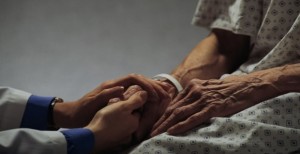The Value of a Single Human Life
 David Perry, the father of a son with Down syndrome, writes, “I’ve spent many years now asserting the need to re-order how we ascribe value to diverse human lives.”
David Perry, the father of a son with Down syndrome, writes, “I’ve spent many years now asserting the need to re-order how we ascribe value to diverse human lives.”
St. John Paul II, on the other hand, taught: “Even in the midst of difficulties and uncertainties, every person sincerely open to truth and goodness can, by the light of reason and the hidden action of grace, come to recognize in the natural law written in the heart (cf. Rom 2:14-15) the sacred value of human life from its very beginning until its end, and can affirm the right of every human being to have this primary good respected to the highest degree.”
Therefore, we can state without hesitation that Perry errs profoundly when he suggests that we as human beings have the right to “ascribe value” to anyone’s life, no matter his age, health, or condition of dependency.
Yet increasingly often in our perverse culture the designs of man have become more important and certainly more pervasive than the natural law. That is what it means to live in a culture of death.
How do such attitudes manifest themselves today? Well, while Perry’s opinion is perhaps the most egregious, he is by no means alone. Mankind is at a crossroads. Wesley Smith writes: “Euthanasia costs lives. Not only do doctors kill people who ask to die—generally without even attempting suicide prevention services—but the ethics-altering values of euthanasia/assisted suicide devalue despairing lives generally.”
We see this culture of death in Quebec, Canada, where reportedly some doctors have allowed a patient who has attempted suicide to die without treatment that might save his life. We see the culture of death in Utah as well, where an 18-year-old man encouraged his girlfriend to commit suicide. He helped her by creating the noose she put around her neck and then filmed her as she slipped off a stool and hung until she was dead. The boy even offered commentary!
Yet, the public is now beginning to see the problems we know exist. Fabian Stahle, author of a new study that looks at Oregon’s physician-assisted suicide laws, has discovered some chilling effects from the legality of this practice. Stahle finds that if a patient is fed up with dialysis and decides to stop getting it, he is then eligible for PAS, as would be a diabetic who, despairing from a failed relationship, just wants to die and stops using his insulin.
These are not patients who are dying; these are people who deserve loving care and compassionate counseling to help them see their value and to get them back to enjoying life. But in Oregon it is suspected such people can ask for and get the death they seek with the aid of a physician!
It is quite clear that David Perry’s comments about his own child and his perspective on ascribing values to human lives has become the norm. Otherwise we would not see laws being passed that open the door, not only to abuses caused by special conditions and illnesses, but even to depression and bullying.
This atmosphere created by the culture of death is like smoke. It spreads everywhere and permeates even the most unsuspecting places with its siren song of choice.
St. John Paul II taught a lot about personal choice as it relates to human dignity and the value of each individual human being. In Veritatis Splendor, he wrote: “Jesus himself is the living ‘fulfilment’ of the Law inasmuch as he fulfils its authentic meaning by the total gift of himself: he himself becomes a living and personal law, who invites people to follow him; through the Spirit, he gives the grace to share his own life and love and provides the strength to bear witness to that love in personal choices and actions.”
Without that framework, man will continue to slip into the chasm of devaluing others for his own sake. Only in Jesus Christ can we make choices and take actions that affirm the value of every single human being’s life.
The choice is ours.

